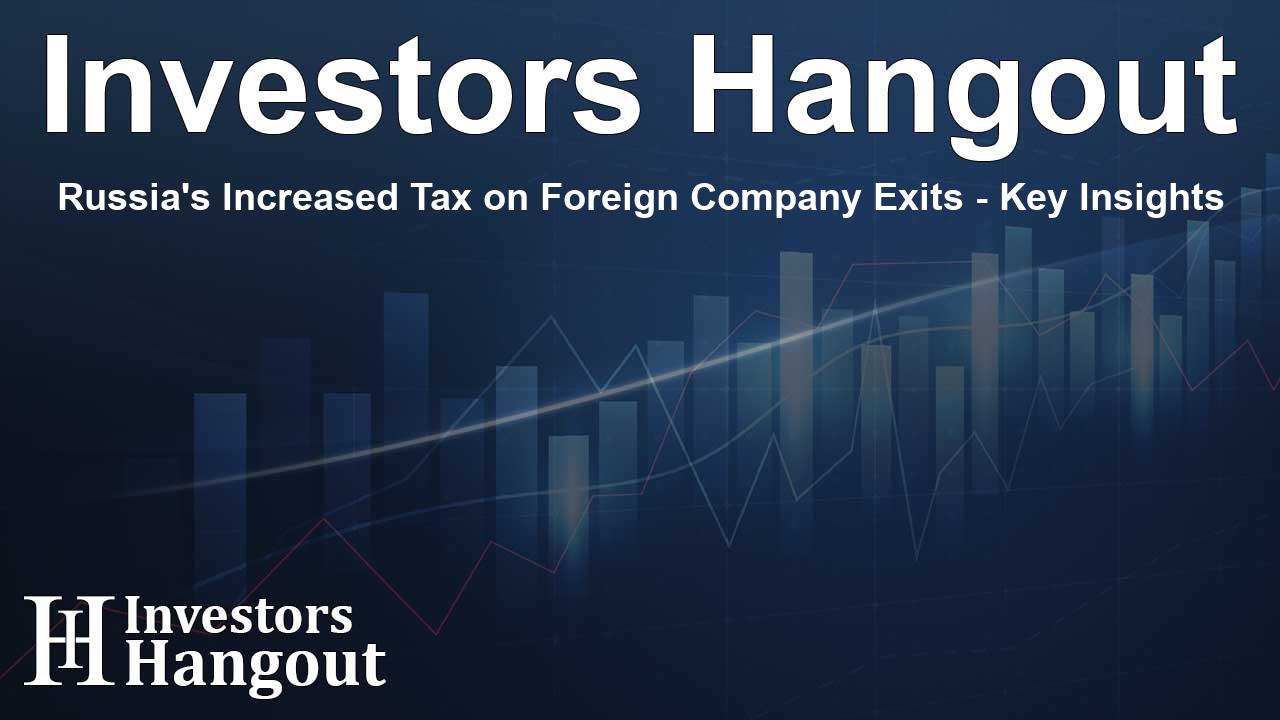Russia's Increased Tax on Foreign Company Exits - Key Insights

Russia Raises Exit Tax on Foreign Companies: An Overview
Recent reports indicate that Russian authorities are planning to raise the one-time exit tax imposed on foreign companies leaving the country from 15% to as much as 35%. This significant increase reflects ongoing economic adjustments and tightens the regulatory framework for foreign businesses operating within Russia.
Reasons Behind the Tax Increase
Since the imposition of Western sanctions due to geopolitical conflicts, particularly following Russia's actions in Ukraine, the country has implemented stricter regulations regarding foreign companies. The exit tax, often referred to as a levy by the U.S., involves a portion of the sale price from these companies being redirected to bolster state revenues.
New Tax Structure and Requirements
According to reports, new provisions will require 25% of a transaction's value to be paid to the Russian treasury within one month of the deal's closure. An additional 5% will follow within one year, and the remaining 5% is expected to be paid within two years. These changes are poised to make it more challenging for foreign companies to exit the Russian market.
Increased Discounts on Asset Sales
Moreover, a key adjustment includes raising the minimum discount companies must accept from 50% to 60% of their assets' value. This escalated requirement is indicative of the Russian government's strategy to control asset valuations and protect its economic interests amidst sanctions.
Impact on Major Transactions
Furthermore, any deal valued over 50 billion roubles (approximately $517 million) will now necessitate approval from President Vladimir Putin. This heightened level of scrutiny suggests an increasing centralization of power regarding significant financial transactions within the country. For foreign investors, navigating these new regulations will be crucial in strategizing exits from the Russian market.
The Role of the Finance Ministry
The government commission responsible for foreign-asset sales, predominantly led by the finance ministry, plays a pivotal role in determining the tax's value and the requisite discounts. As these regulations evolve, it becomes essential for foreign companies to stay informed and be prepared for necessary adjustments in their operational strategies.
Future Considerations for Foreign Enterprises
As the landscape shifts, foreign companies must carefully evaluate their positions in Russia. The increased exit tax and stringent regulations signal a tightening of the business environment, compelling businesses to weigh potential benefits against inherent risks in the market.
Frequently Asked Questions
What is the new exit tax rate for foreign companies in Russia?
The exit tax rate for foreign companies in Russia has been raised from 15% to up to 35%.
How will the new tax structure affect foreign businesses?
Foreign businesses will have to pay a significant portion of their asset sale value as exit tax, complicating their exit strategies.
What discounts must foreign companies accept when selling assets?
Companies are now required to accept a minimum discount of 60% of the asset's value when selling.
Are major transactions subjected to additional requirements?
Yes, any deal over 50 billion roubles will require President Putin's approval.
What role does the finance ministry play in this process?
The finance ministry leads a commission that determines the exit tax value and the required discounts on asset sales.
About Investors Hangout
Investors Hangout is a leading online stock forum for financial discussion and learning, offering a wide range of free tools and resources. It draws in traders of all levels, who exchange market knowledge, investigate trading tactics, and keep an eye on industry developments in real time. Featuring financial articles, stock message boards, quotes, charts, company profiles, and live news updates. Through cooperative learning and a wealth of informational resources, it helps users from novices creating their first portfolios to experts honing their techniques. Join Investors Hangout today: https://investorshangout.com/
Disclaimer: The content of this article is solely for general informational purposes only; it does not represent legal, financial, or investment advice. Investors Hangout does not offer financial advice; the author is not a licensed financial advisor. Consult a qualified advisor before making any financial or investment decisions based on this article. The author's interpretation of publicly available data shapes the opinions presented here; as a result, they should not be taken as advice to purchase, sell, or hold any securities mentioned or any other investments. The author does not guarantee the accuracy, completeness, or timeliness of any material, providing it "as is." Information and market conditions may change; past performance is not indicative of future outcomes. If any of the material offered here is inaccurate, please contact us for corrections.